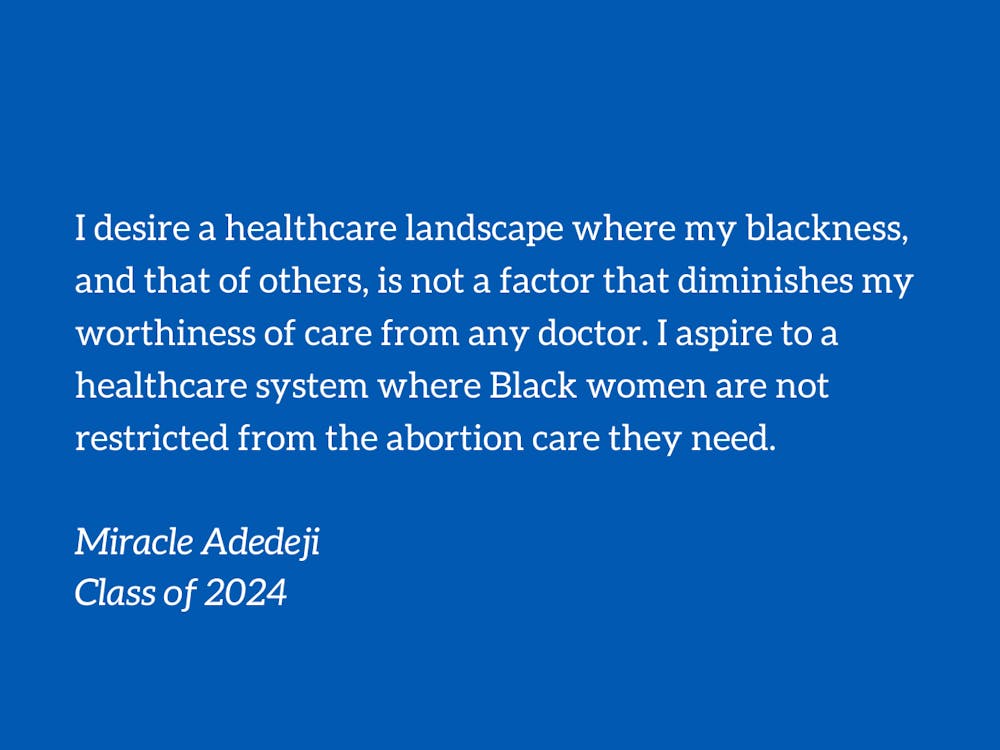This guest column is part of a series of three OP-Eds about abortion care access in North Carolina submitted by members of the Reproductive Health Care Post-Roe (2023-2024) Bass Connections project. More information on the project and provider testimonies can be found on the project’s website.
Picture this: It’s a frantic Monday morning, and you find yourself navigating traffic, desperately trying to make it to work on time. The stakes are high — a presentation crucial for a life-altering promotion awaits. As you speed towards the office, mere minutes away, a sudden construction roadblock appears. It shatters your hopes of reaching that critical meeting. Now imagine you look around, and while the other cars around only have to wait 10 minutes to get past the block, you have to wait an hour. Your frustration is palpable. You feel your transformative professional opportunity slipping out of your hands, out of your control.
Now, transpose this experience to the realm of reproductive rights, where new legislative restrictions in North Carolina cast formidable obstacles for those seeking abortions. Black women — comprising 39% of abortion patients in the United States — were already facing challenges in accessing reproductive health services before the overturning of Roe v. Wade due to limited facilities, particularly in communities with restricted health resources. The escalation of state-level anti-abortion measures has exacerbated these barriers, posing additional hardships for Black women seeking essential reproductive care.
Your hour-long wait — in stark contrast to the mere 10 minutes for those around you — mirrors the challenges faced by Black individuals specifically in accessing proper reproductive care. Systemic biases ingrained in the healthcare system often prevent many patients in the Black community from receiving the reproductive care they need. Sadly, there are now numerous stories of healthcare providers invalidating the pain of Black mothers, perceiving them as less competent in understanding their own bodies and treating these patients unfairly based on preconceived notions and racist ideologies. A 2016 study found that medical students and residents who endorsed false beliefs about biological differences between black and white people exhibited a racial bias in pain perception. This subsequently contributes to racial disparities in pain assessment and treatment.
For instance, in October 2019, Shamony Gibson began to experience sharp chest pain after the birth of her second child by c-section. When she went to the hospital and explained the situation to the medical staff, her doctors persistently asked if she was on drugs, digging their heels into a stereotypical assumption of Ms. Gibson’s lifestyle as a Black woman. Eventually, after her concerns were repeatedly dismissed by her physicians, she died of a pulmonary embolism — a blood clot that travels to the lungs. It is a relatively common complication following significant surgeries like a c-section, a situation that could have been avoided had someone paid attention to her symptoms before it was too late. Shamony Gibson’s tragic story serves as just one of the many examples where Black patients’ concerns are not taken seriously, a pattern that is both dehumanizing and, in some cases, lethal.
Consequently, the unequal level of health care received by Black patients contributes to adverse maternal health outcomes for Black mothers. In 2021, the nationwide maternal mortality rate for Black women was 69.9 deaths per 100,000 live births, which is 2.6 times the rate for non-Hispanic White women. In North Carolina, where 22% of the population is Black, Black women made up 43% of pregnancy-related deaths between 2020 and 2022.
As a Black woman who desires to have children someday, I sincerely hope that neither I nor any other Black individual will have to endure the same kind of treatment as Ms. Gibson did. Fortunately, strides toward addressing racial disparities in reproductive healthcare have been made. California’s comprehensive report titled “Centering Black Mothers” systematically compiles evidence from vital statistics, administrative and survey datasets, and peer-reviewed scientific literature and uses the term “centering” to underscore a focused approach on Black mothers that incorporates their perspectives. Black Mammas Matter Alliance (BMMA) is a network of Black women-led birth and reproductive justice organizations and multi-disciplinary professionals, working across the full spectrum of maternal and reproductive health. BMMA provides technical assistance, training and capacity building for grassroots organizations, maternity care service providers (clinicians, midwives, doula networks and community health workers), academia and the public health industry.
50 years from now, I desire a healthcare landscape where my blackness, and that of others, is not a factor that diminishes my worthiness of care from any doctor. I aspire to a healthcare system where Black women are not restricted from the abortion care they need. It is my hope that no mother will lose their life due to the actions of racist doctors. Instead, I dream of a reality where every Black mother receives evidence-based care, unburdened by the hour-long roadblocks caused by racist ideologies, enabling them to lead healthy and fulfilling lives.
I urge the Duke and Durham communities to direct their attention towards reproductive justice, as it profoundly impacts individuals both on campus and within the city at large. For Duke students, faculty, and staff, reproductive justice is not merely a distant concern but a pressing reality that can shape their access to essential healthcare services. Similarly, residents of Durham are directly impacted by the systemic barriers in the healthcare system that affect their access to proper reproductive care. By engaging in discussions and taking action to address these systemic barriers, we can work towards creating a more equitable and inclusive community where everyone has access to the reproductive healthcare they need and deserve.
Miracle Adedeji is a Trinity senior and a member of the Reproductive Health Care Post-Roe (2023-2024) Bass Connections Project.
Get The Chronicle straight to your inbox
Signup for our weekly newsletter. Cancel at any time.

